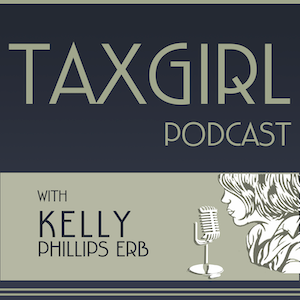65: Small Business Tax Compliance is Simplified with New Intuitive Technology
It’s been a long 18 months for tax professionals–deemed #marchternity on Twitter. But is there light at the end of the tunnel?
According to the 2021 Accountants Confidence Report, tax and accounting professionals are confident their clients’ finances will improve over the next 12-18 months. However, the same report shows industry professionals are also pessimistic about the overall health of small businesses and the US economy within the same time period.
The puzzle of tax compliance is complicated, especially for small businesses. In the midst of ever-evolving tax codes and changing technology, how can business owners remain confident and proactive?
In today’s episode of the Taxgirl podcast, Kelly is joined by Sona Akmakjian to chat about the changing tax landscape and how business owners can remain empowered and informed while embracing new technology. Sona is Avalara’s executive leading global account partnerships and programs. As a CPA with 29 years of transactional tax services and automation experience, Sona is recognized for her deep industry expertise. Her vision is to offer innovative solutions that enable firms to support clients with end-to-end scalable global solutions. She advocates for global, strategic, mutually beneficial relationships with all accounting firms.
Listen to Kelly and Sona talk about technology and tax compliance:
- It’s been such a long year for tax and accounting professionals. What are the things that tax and accounting professionals are concerned about going forward in the profession? Sona says her firm interviewed over 500 accountants during the pandemic and found some surprising results.
- What are the details of the 2018 Wayfair decision, and how does it affect businesses today?
- At the same time, tax professionals are trying to sort out the changing tax laws, businesses are scrambling to stay compliant while the laws are constantly shifting. How can practitioners and business owners stay on top of the curve to remain compliant and proactive?
- What is the “cost” of compliance? Whether it’s new technology, more complex returns, more overhead, etc, the consequences of getting caught out of compliance are always worse than the cost to remain in compliance. But how can businesses plan for that?
- Sona says, “I don’t see how compliance can be achieved in this world without some form of automation.” Technology now allows businesses and tax professionals incredible tools that are both intuitive and efficient.
- How to embrace technology and integrate the systems painlessly. There may be a learning curve, but adopting new systems will alleviate some stress and time in the long run. Sona says that while change management can be challenging, technology will overall add efficiency and accuracy.
- During the pandemic, tax and accounting professionals have had to spread their attention and effort across many additional areas, in both their personal lives and their professional lives. How has this extra fatigue trickled down to the industry as a whole?
- Thinking about the future, what might tax compliance and technology look like in the next few years? Will states become more “aggressive” overall, will there be a greater push for technology, or will there be a shift in the industry standards? Sona says it seems that state governments are becoming more data-savvy, perhaps partly as a result of a big tech push while employees were working remotely.
- Does Sona anticipate any concerns in regard to data sharing between states? Speaking candidly, she says she expects we’ll probably get more and more used to sharing data. “Everything is in the cloud,” she reminds listeners. It’s all about an efficient transition.
- What are Sona’s words of wisdom for professionals that are more reluctant toward technology and data sharing? She says, “Just look at your financial systems. It’s all in the cloud.” As long as the tech companies have the right controls and security systems in place, there’s not much to worry about.
- Commerce has already begun to shift from “where are you selling” to “what are you selling,” with more of a focus on casting a broad global marketing net instead of as much of a focus on a brick-and-mortar storefront. What are the compliance implications of a shift like this?
More about Kelly:
Kelly is the creator and host of the Taxgirl podcast series. Kelly is a practicing tax attorney with considerable experience and knowledge. She works with taxpayers like you every day. One of the things that she does is help folks out of tax jams, and hopefully, keep others from getting into them.
Links:
Kelly’s Website – Taxgirl
Sona’s LinkedIn - Sona Akmakjian
Links to related content:


